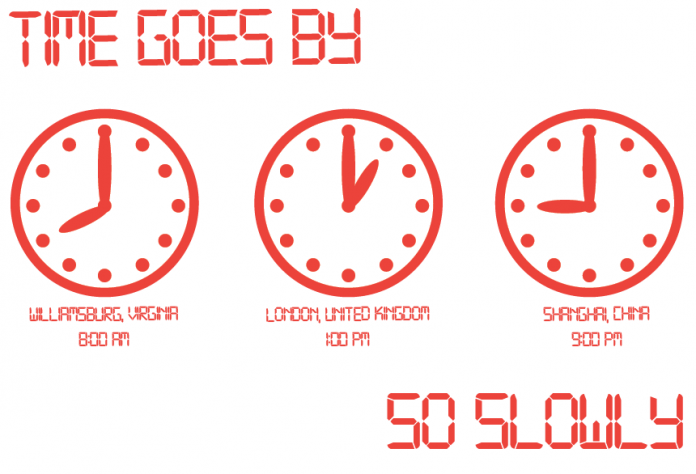Students often lament 8 a.m. classes, but for many international students, having an 8 a.m. class in their time zone would be considered a luxury. A 12 or 13-hour time difference can force international students to take a Zoom class as early as 1 or 2 a.m..
For Kenzie Evans ’24, Zooming in from Jakarta, Indonesia, the 12-hour time difference required him to completely rework his daily schedule for the entire fall 2020 semester.
“My schedule was basically I do nothing all day long and then at night I’d have one or two classes before 12 a.m.,” Evans said. “But one day I’d have a physics class at 2:30 a.m. and that ruined my sleep schedule.”Luckily, international students are given a priority registration time slot to help mitigate the chances of ending up with such a grueling schedule. But in some cases, a difficult schedule is unavoidable, especially for those with required classes for their major or minor.
Sailor Miao ’24 spent the fall semester Zooming in from Beijing, China.
“Of course, I tried to build [my schedule] around my time zone, and it worked out pretty well except for one class at 2 a.m. local time,” Miao said. “But sometimes we all have to make some sacrifices in order to get what we want. One of the more serious problems around that is that we needed to take midterms and finals with you all. For instance, I had to take my gov final from 10 p.m. to 2 a.m. in China. I understand it is crucial to ensure the integrity and fairness of the process, but we need to find a way to help those that are still abroad to have a better schedule.”
Miao decided to live on campus for the spring 2021 semester and is enjoying no longer having to take classes at such difficult times.
While remote asynchronous classes can help international students, since coursework can be completed at any time, they often come at a cost. Many students experience decreased focus as well as loss of social interaction with their classmates and professors. This problem is further exacerbated by international students’ limited ability to participate in various extracurricular activities. Many afternoon and early evening meetings conflict with international students’ already-problematic sleep schedules, preventing many from getting as involved in the community as they would like or forcing them to completely alter their schedules to participate.
Joanne Hu ’24, Zooming in from Nanjing, China during the fall and spring semesters, has been able to get involved in clubs by completely rearranging her schedule.
“It’s about 12 or 13-hours difference, which means I have to live an ‘upside down’ schedule if I want to stick to the normal EST time . . . I can choose classes fitting for my regular schedule, but I can’t decide club activity time,” Hu said. “Most of the clubs hold activities at a time when it is nearly the later half of the night like 3 a.m. or 5 a.m. And I have to say I changed my daily schedules simply because of the timing of clubs and school events. I really want to engage with our community more and get more experience . . . it’s an important part of college life.”
For Evans, joining the community virtually from Indonesia has greatly impacted his ability to connect with fellow students.
“Well, honestly I don’t even know how socializing works,” Evans said. “I haven’t really reached out or met anyone new . . . I think what affects the most here is that I just don’t think I can make many good friends through online. So that just demotivates you.”
In addition to making it difficult to meet new people, difficulties due to time differences limit the extracurricular exploration typical of freshman year, when new students normally scope out different clubs, attend meetings and decide which ones are their best fit through experimentation. Since so many club activities take place at difficult times, many international students end up skipping club meetings altogether. Back-and-forth communication, after all, can only occur at certain mutual hours — though time zone inclusivity, if planned for, is possible. According to Miao, some clubs resolved the problem of finding mutual meeting times by the end of the fall semester, allowing him to attend.
“Sometimes, I had no choice but to dodge some of the club meetings (I just simply couldn’t have a meeting after three hours of early morning classes),” Miao said. “But we have online networks created by members of clubs like the remote students club where they organized mutually compatible times for all of us to meet.”
For those international students whose first language is not English, Zoom audio glitches during lectures are even more anxiety-inducing than they are for native speakers. The experience is reminiscent of listening comprehension tests where the audio is intentionally muffled, forcing the listener to piece together a conversation. Note-taking is difficult enough for students without audio lapses, so glitches only add to the hassle for many already-exhausted international students Zooming in during the middle of the night.
For Hu, whose first language is not English, the language barrier has been a challenge, both in club meetings and class.
“It’s hard to listen and comprehend, especially when there are glitches,” Hu said. “It’s so hard . . . But for some remote asynchronous classes we have videos and there are some auto generated captions for the whole video — that helps me a lot!”
Online learning is certainly far from ideal for everyone, both on-campus and remote students alike, but international remote students face a very unique set of challenges. Luckily, our entire international community will eventually be welcomed to campus and these problems will cease to exist. Until then, the College’s international students will continue to adapt and rise to the challenges that time differences often pose, and hopefully more clubs will be able to implement mutual meeting times to accommodate international remote members.

